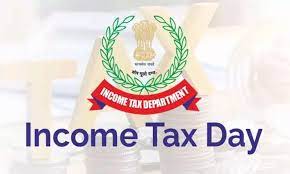Aaykar Diwas Or Income Tax Day 2023: Date, Significance and History

Aaykar Diwas Or Income Tax Day 2023: Date, Significance and History: Every year on July 24, the Income Tax Department honours Income Tax Day or ‘Aaykar Diwas’ to celebrate the beginning of income taxation in the country. On the same day in the year 1860, Income tax was originally introduced in India by Sir James Wilson, to compensate for the losses incurred during the first war of independence. This is the 163rd anniversary of Income Tax Day.
Daily Current Affairs Quiz: July 2023
On Income Tax Day, the CBDT organizes various events and activities to raise awareness about income tax and its importance. These events include seminars, workshops, and outreach programs. On Income Tax Day, the CBDT also issues a commemorative postage stamp. Income Tax Day is a significant day for both the Indian government and taxpayers. It is a day to celebrate the importance of income tax and to reaffirm our commitment to paying our taxes honestly and on time.
Income Tax Day celebrations
In the week preceding the occasion, several activities are undertaken by regional offices of the tax department. Outreach programmes are held across the country to promote tax payment as a value norm, and to sensitise potential taxpayers that paying taxes is an ethical duty of the citizens.
History of Income Tax Day
Sir James Wilson imposed the first income tax in India on July 24, 1860. Wilson did this to make up for the British regime’s losses during the first struggle of independence in 1857.‘Aaykar Diwas’ was celebrated for the first time on July 24, 2010, to mark 150 years of income tax in India.
“Since income tax was first levied as a duty in the year 1860 and the authority to levy that duty came into force on July 24 of that year, it is proposed to celebrate this day as Income Tax Investiture Day,” a finance ministry official said in July 2010.
Income Tax department
Headquartered in New Delhi, the Income Tax department is responsible for direct tax collection for the Government of India. It reports to the Ministry of Finance’s Department of Revenue and is overseen by an apex body known as the Central Board of Direct Taxes (CBDT).
About the Central Board of Direct Taxes
The Central Board of Direct Taxes is a statutory authority functioning under the Central Board of Revenue Act, 1963. The officials of the Board in their ex-officio capacity also function as a Division of the Ministry dealing with matters relating to levy and collection of direct taxes. Historical Background of C.B.D.T.
Important takeaways for all competitive exams:
- Central Board of Direct Taxes chairman: Anita Kapur;
- Central Board of Direct Taxes Established: 1924;
- Central Board of Direct Taxes Headquarters: New Delhi.